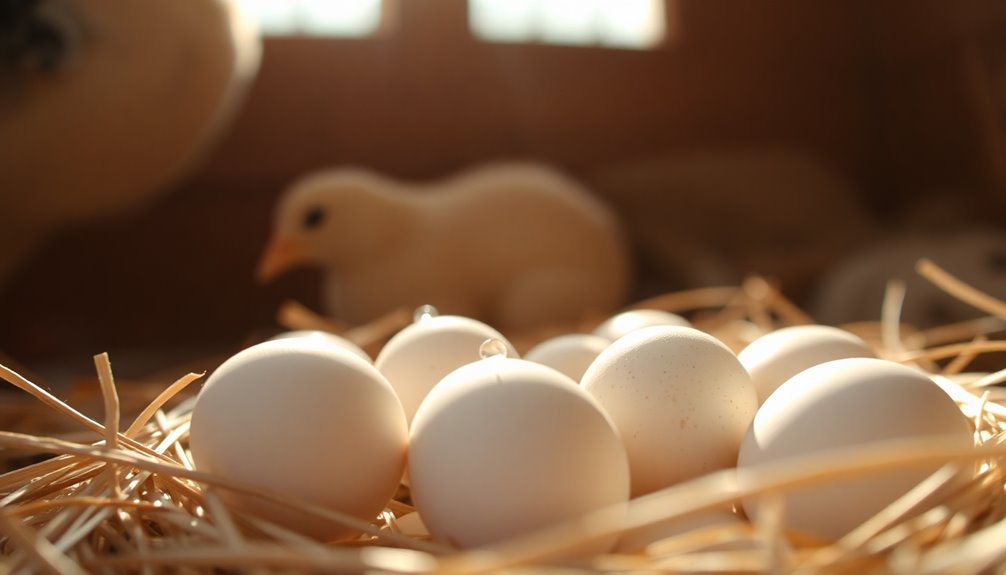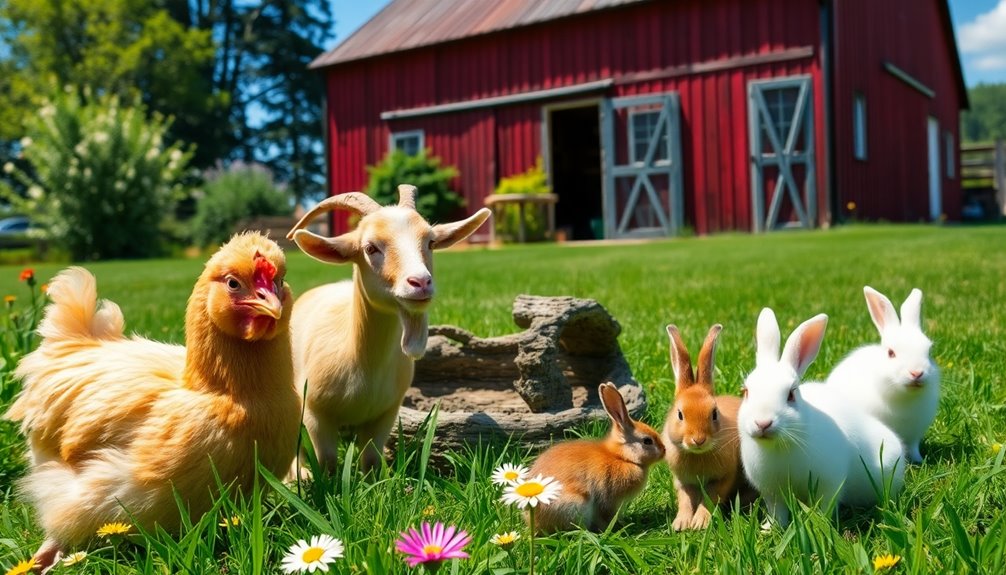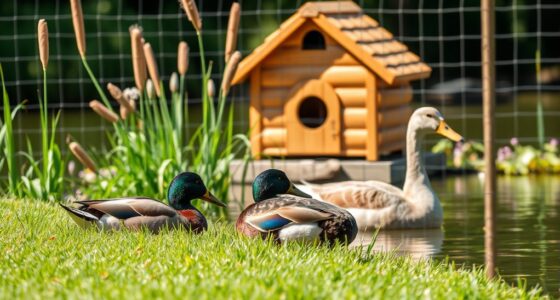To optimize your hatching success, you should rest your eggs for 12 to 24 hours before incubation. This resting period allows the eggs to equalize their internal temperature and reduces the risk of air cell detachment. If you've got older eggs, consider extending the rest time up to 48 hours for the best results. Always unpack shipped eggs immediately and store them pointy end down. Proper management of resting conditions can greatly improve hatch rates, so don't skip this essential step. You might find that there's even more to learn about the best practices for successful hatching.
Key Takeaways
- Rest eggs for 12 to 24 hours before incubation to maximize hatch rates and embryo viability.
- Older eggs may require a resting period of up to 48 hours to stabilize.
- Unpack and rest shipped eggs immediately at room temperature, storing them pointy end down.
- Maintain initial humidity levels at 30-35%, increasing to 50% during the lockdown phase for optimal development.
- Understanding the importance of resting eggs can significantly improve hatching success rates.
Importance of Resting Eggs
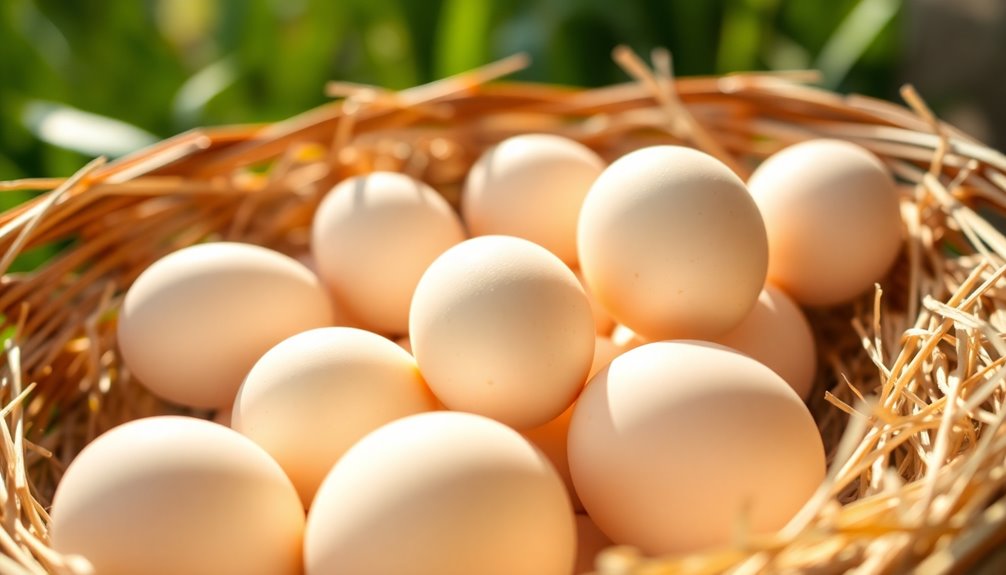
Resting eggs before incubation is essential for maximizing hatch rates and ensuring embryo viability.
When you rest eggs, especially shipped eggs, for 12 to 24 hours, you help equalize their internal temperature and reduce the risk of air cell detachment. This simple step can greatly improve hatch rates.
By allowing eggs to rest, you mimic the natural process, as hens typically don't start incubating immediately after laying. This practice not only stabilizes the eggs but also enhances embryo viability.
Breeders who manage resting periods effectively often report impressive success rates, with some achieving as high as 11 out of 12 hatchlings.
Prioritizing this aspect of the incubation process can lead to more successful hatching outcomes.
Recommended Resting Duration
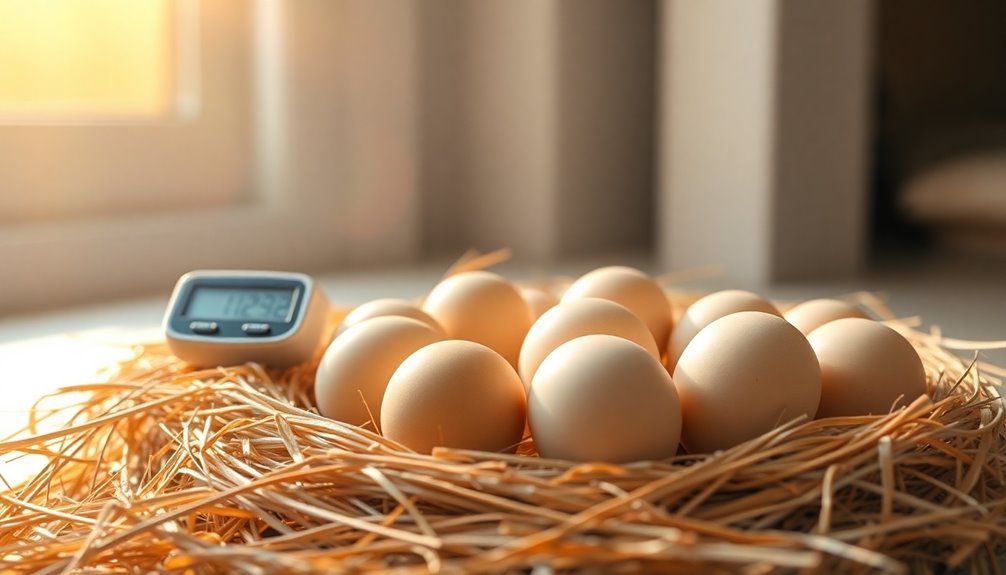
Allowing eggs to rest for the right amount of time is essential for ensuring successful incubation. Most breeders suggest a resting duration of 12 to 24 hours after eggs arrive. This helps stabilize their internal temperature and minimizes the risk of air cell detachment.
If you're dealing with older eggs, consider extending the resting period to up to 48 hours to boost hatch rates. Freshly laid eggs can usually go straight to incubation.
Factors Affecting Resting Time

When you're preparing eggs for incubation, several factors can affect how long they should rest.
Consider the age of the eggs, as older ones might need more time to improve hatchability.
Additionally, shipping conditions and the need for temperature stabilization play essential roles in determining the best resting period.
Egg Age Considerations
Egg age plays a crucial role in determining the appropriate resting time before incubation. Freshly laid eggs usually don't need a resting period and can go straight into the incubator, as they're at ideal internal conditions.
However, if you're working with shipped eggs, you should allow a resting period of 12 to 24 hours. This helps stabilize air sacs and equalize internal temperatures.
For older eggs, especially those stored for over six days, consider extending the resting period to up to 48 hours to enhance viability and improve hatch rates.
Keep in mind that the egg's condition influences its needs; shipped eggs typically require more acclimation time than locally sourced ones.
Shipping Conditions Impact
Shipping conditions greatly impact the resting time needed for eggs before incubation. If your eggs are shipped under ideal conditions, a resting period of 12-24 hours should suffice to help stabilize air cells and enhance hatchability.
However, if they endure extreme temperatures or rough handling in the shipping environment, you might need to extend that resting period to 48 hours. Eggs often experience air cell detachment during transit, making it essential to allow them to rest so the air cells can reattach properly.
Additionally, consider the age of the eggs; older ones may require quicker incubation to maintain viability. Proper handling and appropriate resting can greatly boost your hatch rates, making these factors important for your success.
Temperature Stabilization Needs
Proper temperature stabilization is essential for ensuring ideal conditions before incubation. When eggs arrive, allowing them to rest for 12-24 hours helps equalize their internal temperatures. This resting period reduces stress on the developing embryo and can improve hatch rates. Freshly laid eggs typically don't need a rest, but older eggs may benefit from up to 48 hours to stabilize after cold storage. Rapid temperature changes can hinder embryo development, so it's wise to let eggs reach room temperature gradually, especially if shipped from cold storage.
| Egg Condition | Recommended Resting Period | Importance |
|---|---|---|
| Freshly Laid Eggs | None | Immediate incubation |
| Older Eggs | Up to 48 hours | Stabilizes temperature |
| Shipped Eggs | 12-24 hours | Prevents thermal shock |
Preparing Shipped Eggs
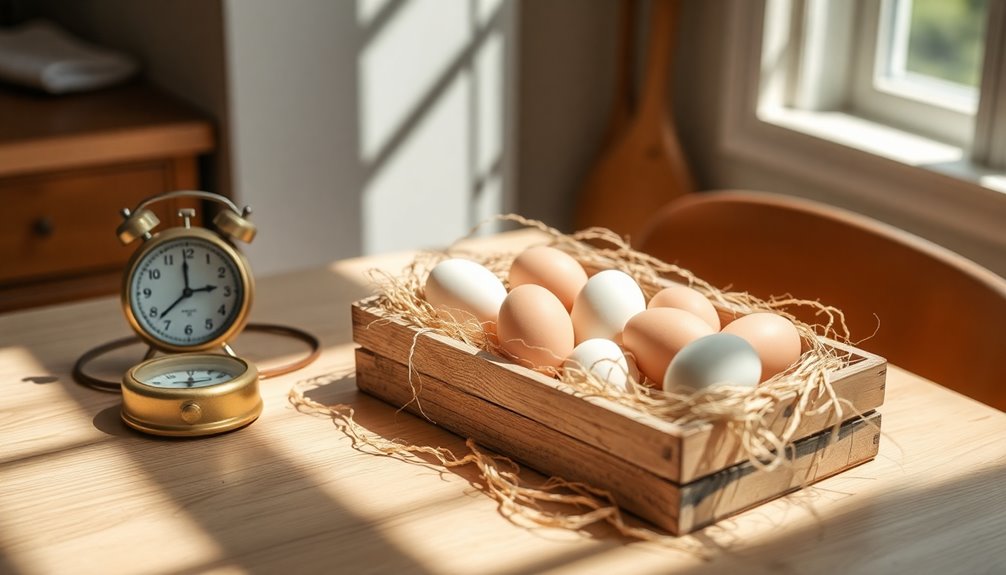
When you receive shipped eggs, unpack them right away and check each one for cracks or damage to confirm they're viable for incubation.
It's vital to inspect each egg carefully, as any flaws can affect their potential to hatch. After inspection, allow the eggs to rest at room temperature for 12 to 24 hours.
This resting period helps stabilize internal temperatures and promotes air cell healing, which is essential for successful incubation. Store the eggs pointy end down in a carton to prevent damage and maintain air cell integrity.
Throughout this time, maintain a stable environment, avoiding any jarring movements that could disturb the eggs.
Once rested, consider candling lighter eggs to assess their viability before proceeding.
Conditions for Optimal Rest

After allowing your shipped eggs to rest, the conditions in which they're kept play a significant role in their acclimatization.
To achieve ideal conditions, place the resting eggs in a stable environment at room temperature. This helps equalize their internal temperature and reduces the risk of air cell detachment, which can negatively impact hatch rates.
For older eggs, consider extending the resting period to 24-48 hours, while fresh eggs may only need 12 hours.
Remember, shipped eggs particularly benefit from a longer resting time compared to locally sourced ones.
Mimicking natural processes, this resting period prepares your eggs for successful incubation, improving your chances of healthy hatchlings.
Personal Experiences in Resting
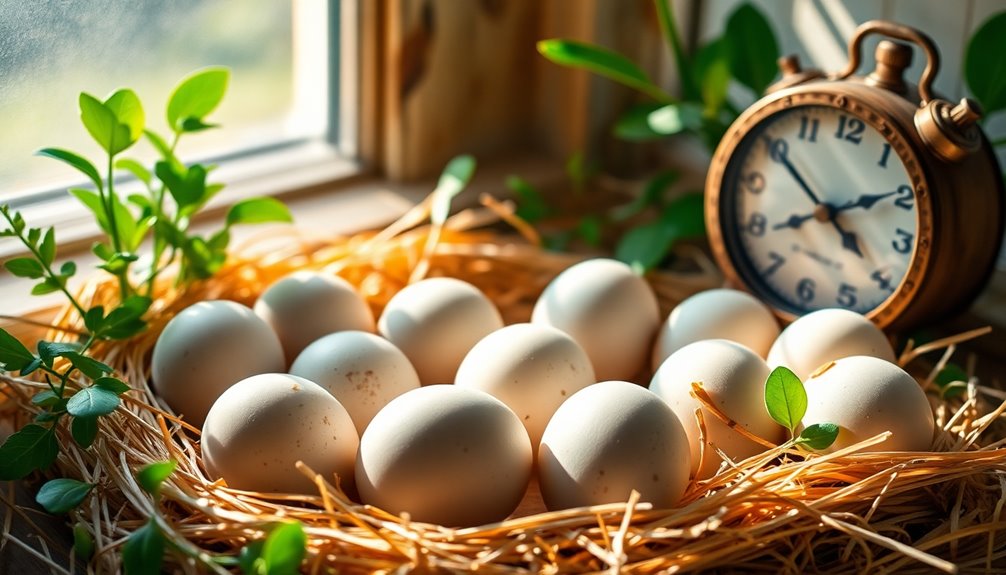
Many breeders find that the duration of resting periods can vary considerably, with some swearing by 12 to 24 hours for ideal hatch rates.
You might notice that your own observations differ, especially if you're working with older or shipped eggs.
It's fascinating to compare how personal experiences shape our understanding of what truly works in egg resting before incubation.
Resting Duration Variability
Resting durations for eggs can vary considerably based on personal experiences and specific circumstances. Many breeders find that a resting duration of 12 to 24 hours is ideal for best temperature equalization and air cell stabilization, leading to improved hatch rates.
You might notice that freshly laid eggs show promising results, with some reporting 11 out of 12 successful hatches after just a 12-hour rest. Conversely, older eggs often benefit from longer resting periods of up to 48 hours to enhance viability before incubation.
However, your experiences may differ; some breeders see little impact on hatch rates whether resting is done or not. Remember, the condition of the eggs—shipped or local—can greatly influence your resting decisions.
Personal Breeder Observations
Breeders often share mixed experiences when it comes to resting eggs before incubation. Some of you might find that allowing eggs to rest for about 12 hours post-transport can lead to impressive hatch rates, like 11 out of 12.
For older eggs, resting for up to 48 hours may help stabilize temperature and allow air cell healing, enhancing viability. However, if you're dealing with freshly laid eggs, immediate incubation is often the way to go since they generally don't require resting.
It's also wise to gradually adjust temperature for eggs from cold storage, as resting can reduce the risk of air cell detachment. Ultimately, your experiences may vary, and finding what works best for you is key.
Common Misconceptions
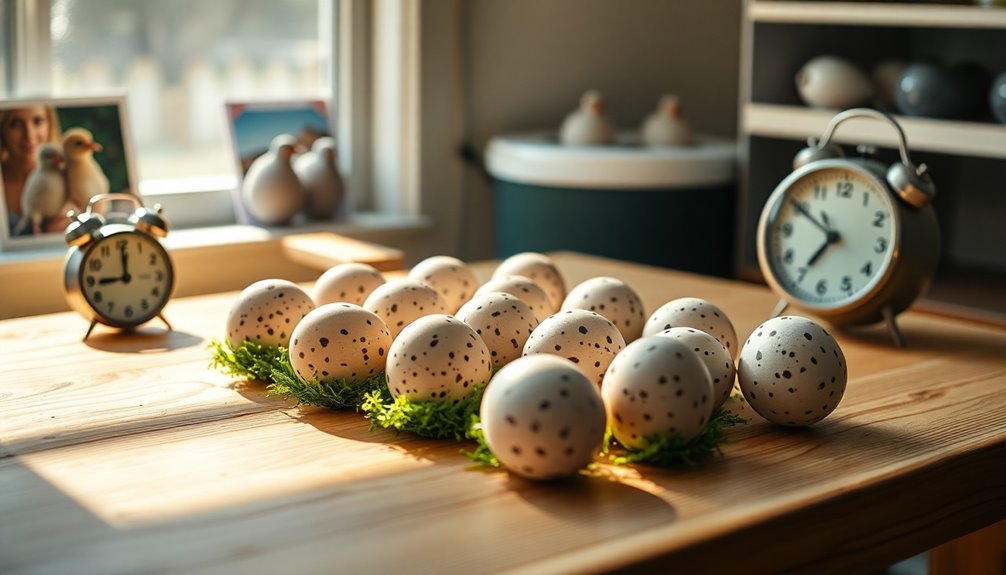
Misunderstandings about the resting period for eggs can lead to less successful hatching outcomes. Many breeders think all eggs require the same rest duration, but freshly laid eggs often need no rest, while older ones might benefit from up to 48 hours.
There's also a misconception that resting eggs only helps shipped eggs; local eggs can see improved hatch rates too. Some assume resting at room temperature is unnecessary, but it helps equalize conditions, reducing air cell detachment risk.
Additionally, it's commonly believed that resting eggs doesn't affect hatchability, yet a 12 to 24-hour rest can enhance embryo viability.
Finally, hens naturally manage resting conditions that influence incubation success, debunking the myth that they don't allow resting.
Best Practices for Hatching
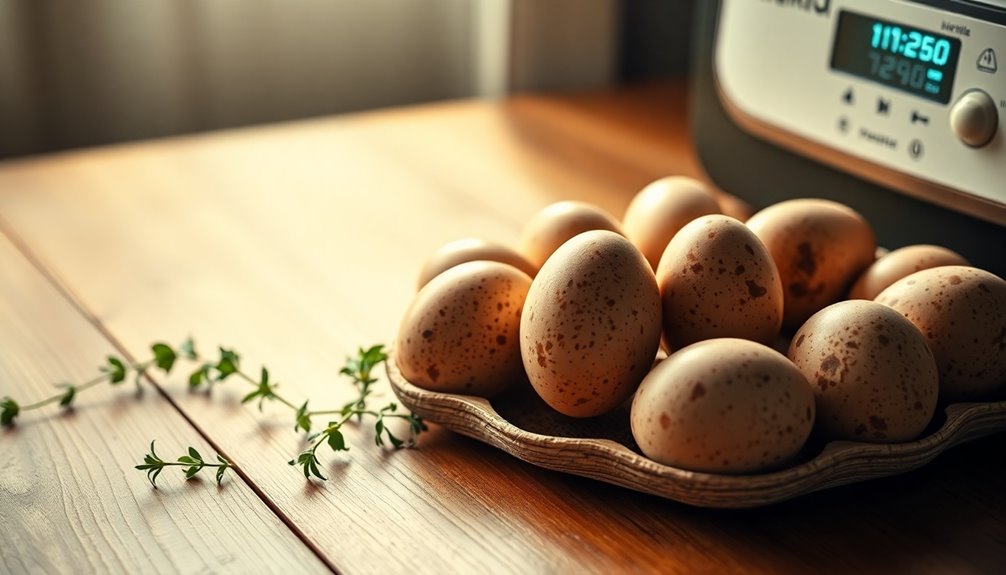
Successful hatching starts long before the eggs enter the incubator.
To optimize your hatching success, follow these best practices:
- Allow your eggs to rest for 12 to 24 hours after arrival.
- Maintain humidity levels between 30-35% initially, increasing to 50% during lockdown.
- Turn eggs gently at least three times a day throughout the incubation period.
Frequently Asked Questions
How Long Should Eggs Rest Before Incubation?
You should let eggs rest for about 12 to 24 hours after they arrive. This resting period helps the internal temperature equalize and minimizes the risk of air cell detachment.
If you're dealing with older eggs, consider extending the rest to 48 hours for better hatch rates. Freshly laid eggs can go straight into incubation, but make sure the room temperature is stable during the resting phase for ideal conditions.
How Long Can an Egg Stay Pipped?
When it comes to hatching, time's a delicate dance. An egg can stay pipped for up to 24 hours before you should consider stepping in.
If it's been more than 12 hours without any progress, it might signal trouble, like malposition. Keep a close eye on the conditions in your incubator, because the right humidity and temperature are essential.
After 72 hours, a chick without food or water might start to struggle.
How Long Can Eggs Sit Out Before Going in the Incubator?
You should ideally let eggs sit out for 12 to 24 hours before placing them in the incubator.
This resting period helps them acclimate to room temperature, stabilizing air sacs and improving hatch success.
If the eggs are older or have been shipped, consider extending the resting time up to 48 hours.
Just remember to handle them gently during this time to avoid any damage that could affect their viability.
What to Do With Eggs Before Incubating?
When you receive your eggs, think of them as fragile treasures waiting to hatch.
First, unpack and inspect them for any cracks. Let them rest for 12-24 hours to stabilize their temperature.
Store them pointy end down to help heal any air sac issues. Maintain a cool, humid environment, and handle them gently to avoid disturbing the embryos.
Conclusion
In the world of hatching, resting eggs is like letting a fine wine breathe before serving. Just as a wine develops its flavors over time, your eggs need that vital pause to guarantee the best outcome. By allowing them to rest for at least 12 to 24 hours, you enhance your chances of successful hatching. Remember, patience pays off—just like waiting for the perfect sip. So, take the time to rest those eggs and watch your little ones thrive!

